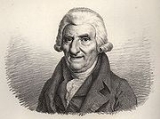
Dominique, comte de Cassini
Encyclopedia
This article is about the French astronomer. For his Italian-born great-grandfather, see Giovanni Domenico Cassini
.
Jean-Dominique, comte de Cassini (June 30, 1748 – October 18, 1845) was a French
astronomer
, son of César-François Cassini de Thury
.
Cassini was born at the Paris Observatory
. In 1784 he succeeded his father as director of the observatory; but his plans for its restoration and re-equipment were wrecked in 1793 by the animosity of the National Assembly. His position having become intolerable, he resigned on September 6, and was thrown into prison in 1794, but released after seven months. He then withdrew to Thury, where he died fifty-one years later.
He published in 1770 an account of a voyage to America in 1768, undertaken as the commissary of the French Academy of Sciences
with a view to testing Pierre Le Roy
’s watches at sea. A memoir in which he described the operations superintended by him in 1787 for connecting the observatories of Paris and Greenwich by longitude-determinations appeared in 1791. He visited England
for the purposes of the work, and saw William Herschel
at Slough
. He completed his father’s map of France, which was published by the Academy of Sciences in 1793. It served as the basis for the Atlas National (1791), showing France in departments.
Cassini’s Mémoires pour servir à l’histoire de l’observatoire de Paris (1810) embodied portions of an extensive work, the prospectus of which he had submitted to the Academy of Sciences in 1774. The volume included his Eloges of several academicians, and the autobiography of his great-grandfather, Giovanni Cassini
.
His youngest son Henri was a botanist of some note.
Giovanni Domenico Cassini
This article is about the Italian-born astronomer. For his French-born great-grandson, see Jean-Dominique Cassini.Giovanni Domenico Cassini was an Italian/French mathematician, astronomer, engineer, and astrologer...
.
Jean-Dominique, comte de Cassini (June 30, 1748 – October 18, 1845) was a French
France
The French Republic , The French Republic , The French Republic , (commonly known as France , is a unitary semi-presidential republic in Western Europe with several overseas territories and islands located on other continents and in the Indian, Pacific, and Atlantic oceans. Metropolitan France...
astronomer
Astronomer
An astronomer is a scientist who studies celestial bodies such as planets, stars and galaxies.Historically, astronomy was more concerned with the classification and description of phenomena in the sky, while astrophysics attempted to explain these phenomena and the differences between them using...
, son of César-François Cassini de Thury
César-François Cassini de Thury
César-François Cassini de Thury , also called Cassini III or Cassini de Thury, was a French astronomer and cartographer.- Biography :...
.
Cassini was born at the Paris Observatory
Paris Observatory
The Paris Observatory is the foremost astronomical observatory of France, and one of the largest astronomical centres in the world...
. In 1784 he succeeded his father as director of the observatory; but his plans for its restoration and re-equipment were wrecked in 1793 by the animosity of the National Assembly. His position having become intolerable, he resigned on September 6, and was thrown into prison in 1794, but released after seven months. He then withdrew to Thury, where he died fifty-one years later.
He published in 1770 an account of a voyage to America in 1768, undertaken as the commissary of the French Academy of Sciences
French Academy of Sciences
The French Academy of Sciences is a learned society, founded in 1666 by Louis XIV at the suggestion of Jean-Baptiste Colbert, to encourage and protect the spirit of French scientific research...
with a view to testing Pierre Le Roy
Pierre Le Roy
Pierre Le Roy was a French clockmaker. He was the inventor of the detent escapement, the temperature-compensated balance and the isochronous balance spring. His developments are considered as the foundation of the modern chronometer...
’s watches at sea. A memoir in which he described the operations superintended by him in 1787 for connecting the observatories of Paris and Greenwich by longitude-determinations appeared in 1791. He visited England
England
England is a country that is part of the United Kingdom. It shares land borders with Scotland to the north and Wales to the west; the Irish Sea is to the north west, the Celtic Sea to the south west, with the North Sea to the east and the English Channel to the south separating it from continental...
for the purposes of the work, and saw William Herschel
William Herschel
Sir Frederick William Herschel, KH, FRS, German: Friedrich Wilhelm Herschel was a German-born British astronomer, technical expert, and composer. Born in Hanover, Wilhelm first followed his father into the Military Band of Hanover, but emigrated to Britain at age 19...
at Slough
Slough
Slough is a borough and unitary authority within the ceremonial county of Royal Berkshire, England. The town straddles the A4 Bath Road and the Great Western Main Line, west of central London...
. He completed his father’s map of France, which was published by the Academy of Sciences in 1793. It served as the basis for the Atlas National (1791), showing France in departments.
Cassini’s Mémoires pour servir à l’histoire de l’observatoire de Paris (1810) embodied portions of an extensive work, the prospectus of which he had submitted to the Academy of Sciences in 1774. The volume included his Eloges of several academicians, and the autobiography of his great-grandfather, Giovanni Cassini
Giovanni Domenico Cassini
This article is about the Italian-born astronomer. For his French-born great-grandson, see Jean-Dominique Cassini.Giovanni Domenico Cassini was an Italian/French mathematician, astronomer, engineer, and astrologer...
.
His youngest son Henri was a botanist of some note.

